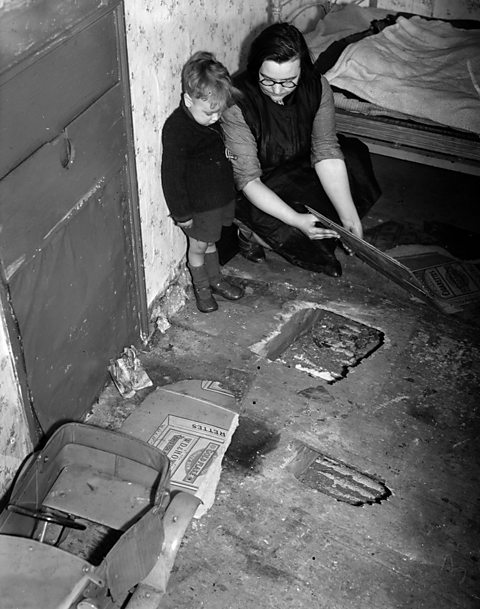'Making ends meet' and emigration from Wales
Unemployment could result in poverty, a failure to meet basic living costs, and a sense of hopelessness. Poverty affected the lives of many people, both physically and mentally.
The pressures of surviving on the dole and dealing with the stress of the Means Test made life difficult, and people struggled to make ends meet.
The male was usually the sole breadwinner, so when he lost his job the whole family suffered. Often, the women had to make the greatest sacrifices. They would eat the smallest portions at meal times as they struggled to feed their families.
Families of the unemployed ate a lot of cheaper food, eg potatoes and bread with margarine, but little of more nourishing food types, eg meat, vegetables, fresh fruit and milk. This made them more likely to suffer other illnesses.
One survey in Stockton-on-Tees showed that a poor family was likely to spend only 3 shillings (15 p) per head on food every week, whereas a more wealthy family spent at least 6 shillings (30 p). In 1936, 4.5 million British people had an inadequate diet.
Women often neglected their own health, eg not purchasing medicine when they were ill. Official reports confirmed that the figures for deaths in childbirth and women’s illnesses were higher in Wales than in the rest of Britain.
Having a child during these years could be very difficult. Not only because of the increased death rate, but also providing the basics like milk and nappies, which were often replaced with things like sugar water and old newspapers.

Many women tried to look after the home on a limited budget or repaired clothes. They often sought employment in domestic service or by working as shop assistants.
They often received lower wages than males for this, and could jeopardise any dole the husband might receive because of means testing. Every year, it became more difficult to repair items as more household goods and clothes became worn and in need of replacement.
Emigration from Wales
Thousands of unemployed workers and their families moved from Wales to the more prosperous or less affected areas, such as the Midlands and south-east England.
In their search for work and a new hope, some took up the government scheme which was arranged to find work and accommodation in England for unemployed Welsh workers.
Due to the war, there was no census taken in 1941 but approximately:
- 430,000 left Wales during the 1920s and 1930s
- Merthyr Tydfil lost 10,000 people during the 1930s